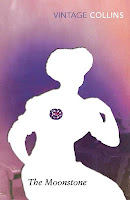Plot summary: When Rachel Verinder receives a gift of an astonishing yellow diamond from her bitter old uncle for her eighteenth birthday, she has no idea that the stone brings great danger with it. When the diamond goes missing during the night the ensuing investigations gradually bring to light the sinister history of the jewel and the passions and plots of those close to Rachel.
Whilst that is an accurate summary, it's almost irrelevant. The fascination with The Moonstone isn't the plot or the mystery; it's how wonderfully it was written.
The basic premise is that the mystery of the diamond has now been concluded, but one of the principal characters is now trying to put together a file on what happened and has asked several other characters to relate their understanding in a sensible, logical manner. We're left with a chronological narrative, from the (extremely biased) perspectives of several changing points of view.
Some parts of this novel are downright hilarious. My favourite characters are Mr Betteredge, a gently sexist butler with absolute loyalty to his Lady, and Miss Clack, an extremely devout and irritating younger relative. It makes me happy that I bookmarked the same quotes this time as I did during my first reading.
From Mr Betteredge:
It is a maxim of mine that men (being superior creatures) are bound to improve women - if they can. When a woman wants me to do anything (my daughter, or not, it doesn't matter), I always insist on knowing why. The oftener you make them rummage their own minds for a reason, the more manageable you will find them in all relations of life. It isn't their fault (poor wretches!) that they act first, and think afterwards; it's the fault of the fools who humour them.From Miss Clack:
Here was a golden opportunity! I seized it on the spot. In other words, I instantly opened my bag, and took out the top publication. It proved to be an early edition - only the twenty-fifth - of the famous anonymous work (believed to be my precious Miss Bellows), entitled The Serpent at Home. The design of the book - with which the wordly reader may not be acquainted - is to show how the Evil One lies in wait for us in all the most apparantly innocent actions of our daily lives. The chapters best adapted to female perusal are 'Satan in the Hair Brush'; 'Satan behind the Looking Glass'; 'Satan under the Tea Table'; 'Satan out of the Window' - and many others.I love how the characters all now know who stole the diamond as they're writing their narratives but have been forbidding from setting it out. It results in them sort of bickering amongst themselves as they criticise decisions that have already been made and indignantly rant about accusations levied at the time. It's so petty and clever and perfectly done. I love (and sympathise with) Miss Clack's petty hatred of Rachel Verinder especially.
It's funny and an absolute joy to read. Reading Wilkie Collins' biography alongside this book has provided a slight insight into certain matters. Druscilla Clack, for example, highlights Mr Collins' distaste for the religion into which his parents tried to force him and the strong female characters throughout the novel confirm (as the biography alleges) that he was quite sympathetic towards women in general. Unlike Mr Betteredge, clearly.
The Moonstone isn't all fun and games, however. It's quite dark in parts - a cursed diamond is stolen, sinister 'Hindoo' men are lurking about, massive debts are entered and hearts are broken. It's lauded as being one of the first modern detective novels (it preceded Sherlock Holmes by 19 years) and I can absolutely see why. There's an all-seeing detective who is never taken seriously, a locked room mystery and witness accounts almost always hold something back. For all that, though, it has dated really well and I still couldn't figure out whodunnit until the very end.
Speaking of timelessness, the thing that impressed me the most about this book was the ending. For a novel about a precious jewel that was stolen from an Indian tribe, the ending is very respectful towards different cultures. It was something that I expected to jar with me throughout my reading, but it was a very pleasant surprise. Very ahead of its time.
I can't explain how much I adore this book and it has to be on my Top Ten Favourite books ever. The characters are delightful (even if you wouldn't exactly want to have dinner with them), the mystery is riveting and the writing is hilarious. Please, please read The Moonstone and then immediately come back here and talk to me about it.


I love the Moonstone too! It's been a while since I read it, but last time I remember being struck by how worried everybody is about the 'Hindoo' men -- they must be terrifying bloodthirsty fanatics, right? But they turn out to be, pretty much, the good guys. I liked how Collins turned the scary fanatic foreigner trope a bit on its head.
ReplyDelete'The good guys' might be a bit of an over-statement! I mean, their MOTIVE was absolutely justified - it kind of annoyed me throughout that they didn't hand the Moonstone over to them on immediately hearing the story!
DeleteThey went to some... drastic lengths to get it back though!
But yes, I know what you mean. By the end they were almust sympathetic.
I know -- just give the diamond back, people! Yeah, I'm on their side.
DeleteI'm so glad you loved this book so much! I especially like the fact that it was humorous and respectful to other cultures!
ReplyDelete